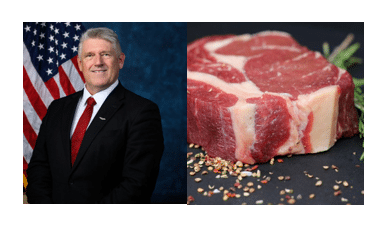Recent comments from President Donald Trump about reducing beef prices by expanding imports from Argentina have stirred concern across the U.S. cattle industry. Many producers worry that increased foreign beef supplies could add volatility to an already fragile market. In response, Montana Congressman Troy Downing reached out directly to the president to share the industry’s perspective and highlight the potential consequences for American ranchers.
Downing said his immediate reaction was to ensure the administration understood the impact of the president’s comments on livestock markets—an impact he described as nearly instantaneous.
“We wanted the administration to recognize how quickly remarks like that can move beef markets,” Downing explained. “The president is focused on lowering grocery store prices, and I understand that concern. But it’s critical that we strengthen and rebuild the American herd rather than replace it with imports.”
Since the announcement, the administration has expressed awareness of the issue and is exploring ways to provide temporary relief for consumers while still committing to long-term strategies that bolster domestic cattle numbers, including a strategy plan to revitalize the U.S. cowherd.
With producers coming off one of the most profitable years the cattle industry has seen, but now facing significant uncertainty, Downing emphasized that their concerns are being conveyed in Washington. “I want Montana ranchers to know their voices are being heard,” he said. “My priority is ensuring they have the tools and support needed to rebuild the herd and continue producing the world’s highest-quality beef.”
Downing’s remarks come as he returns to Washington, D.C., following the end of the longest government shutdown in U.S. history. He noted that lawmakers had been making strong progress before the shutdown halted operations.
“There’s a lot of pent-up energy right now,” Downing said. “My colleagues are eager to get back to work, move legislation through committee, and turn good policy into law. We were elected to legislate—not to get caught in political stalemates. I hope we’ve learned from this experience so we don’t find ourselves in that position again.”
As uncertainty remains in the current state of the cattle market, Montana’s cattle producers can anticipate continued conversations centered on market stability, herd retention, and sustainability for producers’ conversations that will undoubtedly shape the path forward in these unprecedented times.
###
By Colton Young – Northern Ag Network


